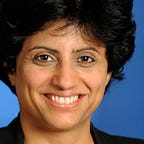How to spot a leader in the making
Look for those who change the dynamic in the room, when it matters.
We all have been in meetings with people whose words and actions have the ability to change the dynamic in the room, to electrify the room, to reduce tension in a meeting, to show courage, and to rally people behind a cause.
These types of people are wired to have an impact on others.
Their attitude, their tone, their presence, how they carry themselves, how they communicate, how they show up, how they act, speak louder than any title they may have.
They are wired to lead. They don’t seek or need permission to lead.
They lead by doing.
The volunteer. This is that person who might be overloaded with work, but who always steps up and says, “I’ll take care of it,” when a new project shows up, or when an unanticipated problem arises. This type of person inspires gratitude in me.
The problem solver. This is that person who confidently says aloud, “It’s going to be fine. We’ve been here before. We’ll be fine,” in a high-stress situation when the rest of the room wants to hit the panic button. This person is a positive-minded problem-solver who restores a sense of normalcy and rational thinking in the room. This type of person inspires me to dig deeper, to think harder, to work together to solve the problem.
The thinker. This is that person whose words carry sincerity, substance, and profound thought. You can hear a pin drop in the room when they speak as everyone realizes that they are listening to something special and of significance. This type of person makes me pause (out of pure respect), listen, and reflect on what matters.
The prepared. This is that person who always shows up ready with all the facts and figures, who has done their homework (and then some), who is prepared to answer every question, who has set out to understand every little detail, and who sweats the small stuff and the big stuff. This person evokes awe in me, as I realize the sheer effort and thoroughness that went into their level of preparation.
The gracious. This is that person who admits a mistake and does so publicly, who openly takes responsibility, who states what went wrong and why. It takes a big person to own a bad situation. This type of person holds themselves accountable to others, without anyone asking it of them. I often forget what the person did wrong, and I am struck more by the courage of their words and the stand that they take. Heck, this person even makes me want to stand up and cheer loudly after they finish their apology-explanation.
The good bad-news breaker. This is that person who can deliver bad news without turning the room upside down. They can calmly state the problem, state the severity of the situation, and talk about the resolution underway. This type of person inspires me with how they appear to be in total control of the situation, even of the bad news itself.
The curious. This is that person who asks questions, who’s eager to know how something works, who does not mind what other people think of their level of expertise or ignorance, but who is simply burning to know the answer. They are consumed by curiosity, and for them, satisfying their curiosity is more important than worrying what others think. This person inspires me with their fearless curiosity — they just have to know how something works.
The enthusiastic. This is that person looks and sounds like they are having way too much fun working, and that they don’t think of work as work. It’s not just that they get things done, but that they get things done with irrepressible joy and zest for the work. It feels like they’ve found their dream job, and that nothing is beneath them or too much for them. Their contagious enthusiasm — for even the smallest and most mundane of tasks — makes me want to work with them.
The volunteer. The problem-solver. The thinker. The prepared. The gracious. The good bad-news breaker. The curious. The enthusiastic.
To me, these are the true leaders in an organization — the people whose actions and words inspire. They may not carry a title, but they carry themselves in a way that others naturally invest them with authority. What they do and say, along with the timing of their actions and words, profoundly impacts others, turns around bad situations, and changes minds. These are the people who are fundamentally decent, who remain true to themselves, and have the courage to show up and show it.
They make me want to be a better person, and they are my role models.
